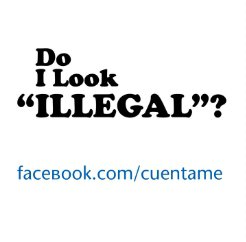BREAKING: Federal Judge OKs 'Show me you papers' Provision in SB1070
 An injuction on the 'show me your papers' provision has been denied. This may greenlight the toughest provision if a future injunction is not approved. On the good, there is a preliminary injunction on the provision that makes it illegal to to harbor anyone suspected of being undocumented.
An injuction on the 'show me your papers' provision has been denied. This may greenlight the toughest provision if a future injunction is not approved. On the good, there is a preliminary injunction on the provision that makes it illegal to to harbor anyone suspected of being undocumented.
via AZ Central
###
A U.S District Court judge on Wednesday denied a request to impose a new injunction on a portion of Arizona's immigration law that requires law enforcement officers to check the immigration status of people stopped during the investigation of other crimes.
U.S. District Judge Susan Bolton did, however, grant a preliminary injunction against a statute making it illegal to harbor individuals suspected of being in the country illegally.
"The governor is pleased with the decision," said gubernatorial spokesman Matthew Benson. "This paves the way for full implementation of SB 1070 as quickly as the district court lifts the injunction."
"What the court has said is that the heart of SB 1070 needs to take effect," he said. "And then the courts can later judge whether there are instances that can be proven of civil rights violations or racial profiling."
Last month, a coalition of civil rights and immigrant advocacy groups asked the court to enjoin a section of Arizona's immigration law that the U.S. Supreme Court reinstated in June after it had been frozen for nearly two years by an earlier injunction.
The high court ruled that Section 2B, which critics call the "show me your papers clause," did not automatically violate constitutional rights and was not necessarily pre-empted by federal immigration law. But the justices suggested that the matter could be reconsidered if evidence of violation surfaced after the law went into effect.
The advocacy groups, which include the American Civil Liberties Union, the National Immigration Law Center, and the Mexican American Legal Defense and Educational Fund, filed a motion for a new injunction on July 17, claiming that public statements by Arizona law enforcement officials suggested that people would be detained longer than is constitutionally permitted while their immigration status was checked.
The advocates also raised a separate claim that SB 1070 was passed with intent to discriminate, in violation of the equal protection clause of the 14th Amendment. They based the discrimination argument largely on e-mails they obtained from legislators, especially from former state Sen. Russell Pearce.
A U.S District Court judge on Wednesday denied a request to impose a new injunction on a portion of Arizona's immigration law that requires law enforcement officers to check the immigration status of people stopped during the investigation of other crimes.
U.S. District Judge Susan Bolton did, however, grant a preliminary injunction against a statute making it illegal to harbor individuals suspected of being in the country illegally.
"The governor is pleased with the decision," said gubernatorial spokesman Matthew Benson. "This paves the way for full implementation of SB 1070 as quickly as the district court lifts the injunction."
They asked that another section forbidding harboring illegal immigrant criminals be enjoined as well.
Gov. Jan Brewer signed SB 1070 into law in spring 2010. It was immediately challenged in lawsuits filed by the U.S. Department of Justice and numerous civil-rights and advocacy groups, including the groups involved in the current motion for injunction.
Before the law took effect, Bolton enjoined Section 2B and three others in response to a motion in the Department of Justice case: one that required immigrants to carry "alien-registration papers;" one that allows for warrantless arrest if an officer thinks there is probable cause to believe the individual committed a public offense that makes him or her removable from the U.S.; and one that makes it a crime for illegal immigrants to solicit, apply for or perform work.
The injunction was upheld in the 9th U.S. Circuit Court of Appeals, and in June the U.S. Supreme Court upheld the injunction except for Section 2B.
The Department of Justice case was based on the concept that federal law pre-empts state law. The new motion for injunction fell under a different case filed by the advocacy groups, and it raises issues besides pre-emption.












Be the first to comment
Sign in with